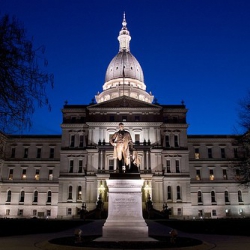
The bill was certain to pass through committee, but the 7-1 vote indicates a level of support not seen before.
The Michigan Senate’s Regulatory Reform Committee voted 7-1 to legalize online gambling on Wednesday The committee voted to approve Senate Bill 203, which would legalize online casinos and poker sites in Michigan.
The outcome of the vote is a surprise to many gambling media members, because the Michigan Senate failed to approve a similar measure last year.
When State Senator Mike Kowall, a Republican from White Lake, introduced a Senate Bill 889 in 2016, the proposal failed to reach the senate floor. To have a near-unanimous vote only a year later is an outlier of a decision.
5 Senators Sponsored SB 203
Though the margin of the vote was surprising, the fact the bill passed through the Regulatory Reform Committee was not. After Sen. Kowall introduced the bill last week, he was able to convince four other committee members to sponser SB 203.
Those five votes represented a majority of the committee, so the 2017 Michigan online gambling bill was certain to reach the senate floor this time around.
The hearing to discuss the issues included many of the usual suspects. John Pappas, head of the Poker Players Alliance spoke at the event, while a representative of Sheldon Adelson’s Coalition to Stop Internet Gambling (CSIG) also answered questions. Nicholas Menas of PokerStars’ parent company, Amaya Gaming, appeared before the committee. So did Innovation Group’s Paul Irvin.
PPA, Amaya Gaming, and Innovation Gaming
Since most of those called recently spoke at a Pennsylvania online gambling hearing, it was no surprise that Mr. Pappas, Mr. Menas, and Mr. Irvin gave positive recommendations on online gambling. Paul Irvin suggested that the annual tax revenues from Michigan online gambling would be around $32 million.
The Coalition to Stop Internet Gambling revisited their traditional arguments, while adding in new alarmist warnings for the senators. Since Donald Trump’s election, CGIS has predicted that new US Attorney General Jeff Sessions would overturn a 2011 Justice Department opinion which said online casinos and poker rooms were legal. When Sessions was a US Senator from Alabama, he stated he thought the 2011 opinion was wrong. He restated that position during his Senate confirmation hearing.
Coalition to Stop Internet Gambling
CSIG used more conventional arguments against legal online gambling. For instance, the geolocation technology was challenged, while the age verification process also was criticized. A more general indictment of the dangers of unregulated online gambling was conflated with regulated online gambling, which is a common tactic with those who oppose iGaming in the United States. John Pappas has become an expert at turning that argument against his opponents, since an argument against unregulated gambling naturally is an argument for legal, regulated gambling.
Peter MacGregor Skeptical of Online Gambling
Sen. Peter MacGregor seemed impressed by the arguments on the geolocation technology, claiming global positioning can be “easily fudged”. None of the other senators seemed to agree. With the ubiquity of GPS technology in cars and on smartphones, people have grown to trust geolocation software and arguments to the contrary carry little weight.
Sen. MacGregor also questioned how many jobs such a measure would create. Sen. Kowall predicted online gambling would create 22,000 jobs in Michigan, which MacGregor thought was wildly inaccurate. Peter MacGregor also questioned whether “bad actors” would be allowed, which is a reference to a debate which rages in California online gambling legislation — whether PokerStars would be allowed to participate.
David Murley on Taxing Online Gambling Sites
David Murley, the deputy director of the Michigan Gaming Control Board, made the best argument of the day against Michigan online gambling. Dep. Director Murley noted that the State of Michigan was barred by federal gaming laws from taxing tribal gaming revenues beyond the cost of regulating such activities, throwing into question whether the Michigan Treasury Department could collect those $32 million in estimated revenues.
According to Murley, Michigan only can collect additional tax revenues if it grants the tribes special concessions. An example of those concessions would be to grant exclusivity over a type of gaming or a monopoly over a certain geographic area. Since private casinos exist in the state, the Michigan legislature would have to decide which license holders would be allowed to launch online gambling sites.
Despite that concern, seven of the eight state senators approved Senate Bill 203. SB 203 next goes to the floor of the Michigan State Senate for a full vote. If it passes on the floor, then a similar proposal will need to pass in the Michigan House of Representatives. Governor Rick Snyder would need to sign SB 203 into law, if it passed both houses.
